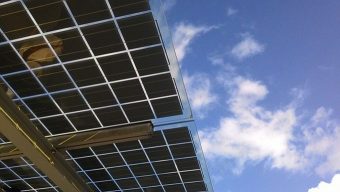
Global renewable energy capacity increased by 161GW last year setting a new deployment record for the sector, according to the International Renewable Energy Agency (IRENA).
The Abu Dhabi-based agency estimated that total installed renewable energy capacity topped 2,000GW for the first time late last year, reaching 2,006GW of installed capacity thanks to a surge in solar deployments last year.
The figures from the group’s Renewable Energy Capacity Statistics 2017 report confirm renewable energy capacity grew 8.7 per cent last year with almost half the total coming from solar projects. A record 71GW of new solar energy was deployed as costs continued to fall across the sector. Meanwhile, 51GW of wind capacity was added last year, alongside 30GW of hydropower, 9GW of bioenergy, and just under 1GW of geothermal energy capacity.
“We are witnessing an energy transformation taking hold around the world, and this is reflected in another year of record breaking additions in new renewable energy capacity,” said IRENA director-general Adnan Z. Amin in a statement. “This growth in deployment emphasizes the increasingly strong business case for renewables which also have multiple socio-economic benefits in terms of fueling economic growth, creating jobs and improving human welfare and the environment.”
However, he warned the pace of deployment was still not fast enough for the world to meet its agreed decarbonisation targets. “Accelerating this momentum will require additional investment in order to move decisively towards decarbonising the energy sector and meet climate objectives,” he said, adding that the new data was nevertheless “an encouraging sign that though there is much yet to do, we are on the right path”.
The data reiterates that Asia has cemented its position as the world’s most important renewable energy market, accounting for 58 per cent of new renewable additions in 2016, and taking its installed capacity to 812GW or roughly 41 per cent of global capacity.
Asia was also the fastest growing region, with a 13.1 per cent increase in renewable capacity. However, there are also signs of the growing health of the African market with 4.1GW of new capacity in 2016, representing a doubling on the performance achieved in 2015.
The report comes as the world continues to consider the implications of US President Donald Trump’s decision earlier this week to issue an executive order rolling back a raft of US climate policies and promising to revive the coal industry.
Chinese state media yesterday accused the Trump administration of “selfishness” in trying to boost the coal industry when all other major economies were attempting to decarbonise and step up investment in clean energy.
However, separately a report fron this week from the think tank Clean Energy Canada argued Trump was unlikely to have much impact on encouraging global clean energy trends.
The report, entitled The Transition Takes Hold, argued that in addition to delivering record deployment levels the clean energy industry now employs 6.7 million people worldwide.
It also notes that the solar industry created one out of every 50 new jobs in the US last year, while wind turbine technician is America’s fastest-growing occupation.
The report adds that he rollout of renewables is now set to accelerate as costs continue to fall, with IRENA projecting onshore wind costs will fall a further 26 per cent through to 2025, while offshore wind costs are expected to fall 35 per cent and utility-scale solar PV costs drop 57 per cent.
“Thanks to falling technology costs, many renewables are competing with fossil fuel alternatives, creating new jobs and cutting pollution,” said Dan Woynillowicz, policy director at Clean Energy Canada. “And those costs are projected to keep dropping.
“As President Trump decides how to approach clean energy, he will no doubt be informed by two key metrics: the opinion of his supporters and what the sector means for jobs. On both counts, the odds are in clean energy’s favour.”
Source: businessgreen.com

